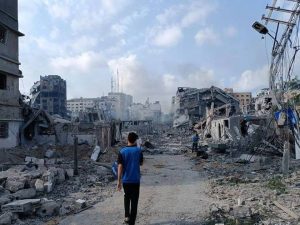Le titre de cet article est intentionnellement inversé par rapport à la célèbre phrase « Pessimisme de l’intellect, optimisme de la volonté » lancée par le penseur italien Antonio Gramsci (1891-1937) dans son journal L’Ordine Nuovo. Son propos était que l’optimisme fondé sur une vision réaliste d’une réalité en crise conduit au pessimisme intellectuel et paralyse la capacité de la société à affronter les obstacles à la paix, au progrès et au bien-être. Le réalisme pur sans optimisme défait la société et lui ôte la volonté de changer et de réaliser ses aspirations pour un avenir meilleur.
Aujourd’hui, dans le contexte de cette guerre malveillante, à tous égards, nous sommes une société vaincue, vaincue par des décennies d’optimisme de l’intellect et de pessimisme de la volonté, ou plutôt par la beauté, l’embellissement et parfois la falsification de la réalité au lieu de l’affronter dans toute sa laideur, incapable ainsi de changer sa trajectoire.
Une société vaincue et fragmentée, qui a perdu plus de deux millions de vies dans une série de guerres internes qui n’ont pas cessé depuis avant l’indépendance jusqu’à l’aube fatidique du 15 avril 2023, et deux millions de crimes pour lesquels personne n’a été tenu responsable.
Depuis le déclenchement de la guerre actuelle, des dizaines de milliers ont péri à cause de la violence directe, de la faim et des maladies, les biens publics et privés ont été pillés et détruits, et plus des deux tiers de la population risquent de mourir de faim, des millions étant déplacés ou réfugiés.
Malgré l’optimisme de certains dans les premiers mois de la guerre quant à la possibilité de l’arrêter rapidement pour éviter un effondrement total, aujourd’hui, compte tenu de sa dynamique interne, il est probable qu’elle se poursuive pendant de nombreuses années encore, et même si elle s’arrêtait ce soir, elle laisserait des blessures qui pourraient ne jamais guérir et des destructions qui pourraient ne jamais être effacées.
Alors que la guerre continue sans but, des voix d’acclamation s’élèvent, et des carnavals funéraires célèbrent la formation de gouvernements dépourvus des normes minimales de légitimité, préparant la division du pays et la poursuite de sa descente vers l’inconnu. Ce chemin est conduit par des cartels militaro-commerciaux dirigés par des seigneurs de la guerre des deux côtés du front, enveloppés de façades civiles fragiles à peine capables de couvrir les mains tachées de sang.
La situation s’assombrit davantage avec la chute de factions respectées parmi ceux concernés par la confrontation à l’épreuve et considérés comme faisant partie des forces “civiles démocratiques” dans le piège de la polarisation facile tendu par les parties belligérantes aujourd’hui. Une large frange reste occupée à se déchirer moralement, à s’accuser et à diaboliser au lieu de s’unir et de concentrer les efforts pour faire face à l’effondrement, aborder l’horrible tragédie humanitaire, affronter les criminels de guerre, les tenir responsables et les poursuivre, même moralement.
Cette série d’articles vise à contribuer à un dialogue constructif entre camarades démocrates, loin du tumulte émotionnel, de la désinformation médiatique systématique et de la propagande de guerre qui ont empoisonné l’espace public et l’ont entraîné dans les profondeurs d’un marécage nauséabond. Cela se fait en tentant une analyse rigoureuse et franche de la réalité, en répondant à la question des causes de l’effondrement — subjectives, objectives et historiques — puis en persévérant à saisir ce que l’on peut décrire comme l’optimisme de la volonté, la volonté d’action possible visant un avenir meilleur.
Qui est responsable de la guerre et de ses conséquences ?…
Il ne fait aucun doute que la direction et les membres du Parti du Congrès national ont travaillé à déclencher et à entretenir cette guerre en préparant ses membres et agents actifs infiltrés dans l’armée, les appareils de sécurité officiels et non officiels, et autres. Parmi de nombreuses autres étapes, ils ont tiré la première balle au matin du 15 avril 2025. Cependant, les causes du déclenchement et de la poursuite de cette guerre résident également dans le vide constitutionnel et institutionnel imposé par le coup d’État d’octobre 2021 dirigé par l’armée et son allié, les Forces de soutien rapide, ainsi que dans les distorsions structurelles inhérentes à l’État soudanais depuis 1956, qui ont produit le phénomène du mouvement islamique soudanais, des milices armées et des cartels commerciaux criminels.
Cela signifie que, dans l’attribution des responsabilités et la recherche d’une issue, ces articles peuvent être considérés comme un appel à dépasser la vision simpliste qui, intentionnellement ou non, ignore le contexte historique complexe et place toute la responsabilité exceptionnellement sur le mouvement islamique. Par conséquent, poussé par une pensée émotionnelle et parfois magique, cela complique tous les espoirs superficiels de résoudre le problème soudanais, en se concentrant exceptionnellement sur l’élimination de ce “groupe” qui a empoisonné la vie politique, économique et sociale du Soudan pendant des décennies, sans préciser les moyens.
Cela néglige également d’autres éléments essentiels, notamment l’économie politique d’une part, et d’autre part l’influence importante des puissances régionales et internationales dans la formation des événements depuis la chute de l’ancien régime et avant.
Pour trouver la réponse la plus juste à la question ci-dessus, commençons par reconnaître abstraitement que la guerre actuelle est une déclaration de l’échec du projet politique et de développement de l’État dont les frontières ont été tracées par le colonisateur et nommé Soudan.
La succession des événements et des décisions depuis 1956 et leurs résultats accumulés ont produit une réalité dans laquelle la guerre était inévitable parce qu’elle est une réalité où les références morales et la primauté du droit ont disparu, remplacées par des outils de violence, de répression, de corruption et d’argent politique pour acheter des loyautés comme éléments clés du conflit pour le pouvoir et la richesse.
Cela signifie que la question à laquelle ces articles cherchent à répondre, même partiellement, est comment arrêter durablement la guerre, éliminer les armes et la corruption comme outils pour résoudre les conflits politiques, sociaux et économiques, et les remplacer par des outils sains permettant aux peuples soudanais de coexister pacifiquement sur cette zone géographique définie. Et leur permettre de construire un État souverain dont les institutions représentent tous les citoyens, auquel les individus et les groupes doivent allégeance en priorité avant toutes les formes de loyautés religieuses, tribales, ethniques, confessionnelles ou autres, et dont l’autorité est volontairement soumise par tous les individus et groupes, incarnée par son monopole sur la violence légale et sa présence effective — à travers eux — aux niveaux souverain, législatif, exécutif et judiciaire.
Un État où tous les individus et groupes qui en font partie, sans discrimination, ont la capacité de mobilité sociale et politique libre et de participation à la gestion des appareils de l’État sur un pied d’égalité… un État qui accueille tous.
À suivre













Recommended for you
طالب الرفاعى يؤرخ لتراث الفن الكويتى فى "دوخى.. تقاسيم الصَبا"
مدينة المعارض تنجز نحو 80% من استعداداتها لانطلاق معرض دمشق الدولي
تقديم طلبات القبول الموحد الثلاثاء و640 طالبا سيتم قبولهم في الطب
البريد المصري: لدينا أكثر من 10 ملايين عميل في حساب التوفير.. ونوفر عوائد يومية وشهرية وسنوية
سمو الشيخ عيسى بن سلمان بن حمد آل خليفة يستقبل سفير الولايات المتحدة الأمريكية لدى مملكة البحرين
الجغبير: القطاع الصناعي يقود النمو الاقتصادي